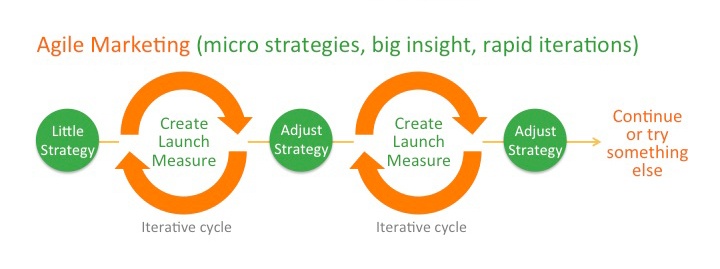Contents
Marketing, by its very nature, is always trying to stay one step ahead of the curve in terms of technology, philosophy and methods. This is why it comes as no surprise that marketing experts are buzzing about agile, the popular software development methodology.
Let us fill you in: what is Agile inbound marketing? Why is everyone talking about it? And, more importantly, how can you leverage it in your marketing practice?
Traditional Project Management in Marketing
The traditional project management methodology sets a goal, divides it into steps, and proceeds as a "waterfall”, with the completion of each stage triggering the start of the next until the whole project is finished among fanfares and confetti.
"Learn from yesterday, live for today, hope for tomorrow. The important thing is not to stop questioning." - Albert Einstein
This has served everyone well for a long time, but times have changed. A marketing firm can no longer spend 6 months planning and developing a traditional marketing strategy, because the competition may be faster and capture the leads in the meantime.
Agile Project Management in Marketing
Agile marketing operates in small cycles called sprints, so that instead of waiting a long time for "completion” and “perfection” you get a lot of smaller parts operating sooner, which you can start to evaluate and improve even as you’re beginning to work on the next sprints. SCRUM, which you also may have heard of, is the methodology that is most popular right now for managing sprints.
“Perfection is not attainable, but if we chase perfection we can catch excellence.” -Vince Lombardi
Digital and particularly inbound marketing, by its very nature, is ideal for the agile philosophy and the SCRUM methodology: instead of working on a perfectly coordinated press and media campaign with a huge launch, digital marketing will operate in small, quick increments: a social media plan, an email funnel, an addition to the website.

The marketing team then evaluates results and adjusts on the march before launching the next iterations. Growth-driven design of websites follows the Agile system perfectly, by gradually adding sections according to website priorities, user preferences and feedback.
What Is Lean Methodology?
This all ties in with the currently popular Lean methodology, which aims to keep even the largest corporation as nimble and swift on its feet as an up-and-coming start up. For example, Lean preaches the build-measure-learn feedback loop: rather than sending out mailers over and over you send one, evaluate its success, improve what is coming up short, and then produce better materials.
Sounds just like an Agile sprint, doesn’t it? Lean also emphasizes focusing on the right metrics: instead of boasting of your huge Twitter following, evaluate the number of leads or conversions and focus on growing those.
One point that the Lean methodology brings home over and over is that things will not be perfect the first time - and that is OK, even for a large company. Use a system such as the 5 Whys to carefully evaluate successes and shortcomings, make some changes, and try again. Then evaluate again. Rinse, repeat. This experimental, continuously improving new method of working will keep your agile marketing in a state of constant evolution, sprint after sprint after successful sprint.
The Benefits of Agile Marketing
Studies have shown there are three major benefits of converting to agile inbound marketing:
- Performance: the faster delivery and greater focus makes for better results that you can measure.
- Employee Happiness: teamwork is a major element of SCRUM, and your team will feel more fulfilled and engaged with the faster-paced goals and more frequent success.
- Adaptability: since you are always developing, you can easily absorb new trends and react to market changes almost in real time.
If you’re ready for your inbound marketing to hit the ground running, take a look at our FREE Inbound marketing Checklist.


Ashley Quintana, M.S., B.A.
Ashley Quintana is a co-founder of BridgeRev. In her role, she develops, leads, and executes digital marketing strategies for the company’s growing client base, including a Fortune 500 subsidiary and an NBA basketball team. Ashley’s work can be found in the Hispanic Journal of Behavioral Science, and she is an OKC.biz 40 Under 40 honoree for her leadership in business and community. She frequently speaks at universities, churches, and conferences on marketing, diversity, and business.


